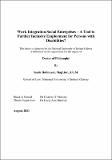| dc.contributor.advisor | Buckley, Lucy-Ann | |
| dc.contributor.author | Hofmayer, Sarah | |
| dc.date.accessioned | 2021-09-16T12:36:37Z | |
| dc.date.issued | 2021-09-15 | |
| dc.identifier.uri | http://hdl.handle.net/10379/16961 | |
| dc.description.abstract | This thesis examines Work Integration Social Enterprises (WISE) from the perspective of the right to inclusive employment, as set out in the United Nations Convention on the Rights of Persons with Disabilities (CRPD).
I argue that there is a need for increased engagement with social enterprises in international human rights law. An analysis of the literature on WISE shows that CRPD considerations have in many cases not found their ways to social enterprise research and practice. I found that this leads at times to an exclusion of some persons with disabilities or resulting in approaches that do not further participation in employment and society. This is based on a lack of awareness by social enterprises as well as their near invisibility in a human rights context. Given the current lack of explicit engagement, I suggest framing WISE under the legal concept of positive measures.
To test the theoretical findings relating to a lack of permeability and inclusivity, a comparative study of the legislative and regulatory framework in Austria, Ireland and Italy was carried out, countries that have adopted very different approaches towards WISE. Qualitative interviews in all three countries supplement the legal case studies, to learn from lived realities whether WISE furthered empowerment and inclusivity. The approaches taken, permeability and human rights compliance varied greatly between WISE visited in each country, despite the considerable differences in legislation.
Building on these findings, I identify the next steps to support WISE in promoting inclusive employment. They focus on developing indicators relating to permeability and labour law compliance while arguing for financial and business supports that do not restrict the economic operations of the enterprise. My thesis takes an important step towards not only promoting greater human rights compliance by WISE but also towards recognizing social enterprises more generally in human rights law. | en_IE |
| dc.publisher | NUI Galway | |
| dc.rights | Attribution-NonCommercial-NoDerivs 3.0 Ireland | |
| dc.rights | CC BY-NC-ND 3.0 IE | |
| dc.rights.uri | https://creativecommons.org/licenses/by-nc-nd/3.0/ie/ | |
| dc.subject | social enterprise | en_IE |
| dc.subject | CRPD | en_IE |
| dc.subject | inclusive employment | en_IE |
| dc.subject | Law | en_IE |
| dc.subject | Business, Public Policy, and Law | en_IE |
| dc.subject | Human rights | en_IE |
| dc.title | Work integration social enterprises - A tool to further inclusive employment for persons with disabilities | en_IE |
| dc.type | Thesis | en |
| dc.contributor.funder | Irish Research Council | en_IE |
| dc.local.note | This research examines the potential of Work Integration Social Enterprises to contribute to inclusive employment for persons with disabilities. It is a socio-legal research, comparing the legal and policy frameworks and lived realities in three countries- Austria, Ireland and Italy. The findings show that outcomes vary largely between social enterprises. | en_IE |
| dc.description.embargo | 2025-09-14 | |
| dc.local.final | Yes | en_IE |
| nui.item.downloads | 0 | |


